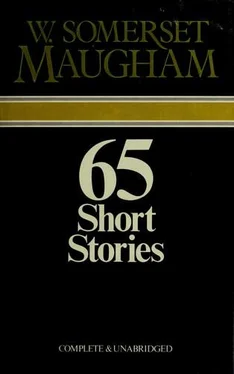Somerset Maugham - Sixty-Five Short Stories
Здесь есть возможность читать онлайн «Somerset Maugham - Sixty-Five Short Stories» весь текст электронной книги совершенно бесплатно (целиком полную версию без сокращений). В некоторых случаях можно слушать аудио, скачать через торрент в формате fb2 и присутствует краткое содержание. Жанр: Фантастика и фэнтези, на русском языке. Описание произведения, (предисловие) а так же отзывы посетителей доступны на портале библиотеки ЛибКат.
- Название:Sixty-Five Short Stories
- Автор:
- Жанр:
- Год:неизвестен
- ISBN:нет данных
- Рейтинг книги:4.5 / 5. Голосов: 2
-
Избранное:Добавить в избранное
- Отзывы:
-
Ваша оценка:
- 100
- 1
- 2
- 3
- 4
- 5
Sixty-Five Short Stories: краткое содержание, описание и аннотация
Предлагаем к чтению аннотацию, описание, краткое содержание или предисловие (зависит от того, что написал сам автор книги «Sixty-Five Short Stories»). Если вы не нашли необходимую информацию о книге — напишите в комментариях, мы постараемся отыскать её.
Sixty-Five Short Stories — читать онлайн бесплатно полную книгу (весь текст) целиком
Ниже представлен текст книги, разбитый по страницам. Система сохранения места последней прочитанной страницы, позволяет с удобством читать онлайн бесплатно книгу «Sixty-Five Short Stories», без необходимости каждый раз заново искать на чём Вы остановились. Поставьте закладку, и сможете в любой момент перейти на страницу, на которой закончили чтение.
Интервал:
Закладка:
'You don't regret Apia, do you?' he asked her once.
'Oh, no-I think it's very nice here.'
An obscure misgiving drove him to make disparaging remarks about the island and the people there. She smiled and did not answer. Very rarely she received a bundle of letters from Samoa and then she went about for a day or two with a set, pale face.
'Nothing would induce me ever to go back there,' he said once. 'It's no place for a white man.'
But he grew conscious that sometimes, when he was away, Ethel cried. In Apia she had been talkative, chatting volubly about all the little details of their common life, the gossip of the place; but now she gradually became silent, and, though he increased his efforts to amuse her, she remained listless. It seemed to him that her recollections of the old life were drawing her away from him, and he was madly jealous of the island and of the sea, of Brevald, and all the dark-skinned people whom he remembered now with horror. When she spoke of Samoa he was bitter and satirical. One evening late in the spring when the birch trees were bursting into leaf, coming home from a round of golf, he found her not as usual lying on the sofa, but at the window, standing. She had evidently been waiting for his return. She addressed him the moment he came into the room. To his amazement she spoke in Samoan.
'I can't stand it. I can't live here any more. I hate it. I hate it.'
'For God's sake speak in a civilized language,' he said irritably.
She went up to him and clasped her arms around his body awkwardly, with a gesture that had in it something barbaric.
'Let's go away from here. Let's go back to Samoa. If you make me stay here I shall die. I want to go home.'
Her passion broke suddenly and she burst into tears. His anger vanished and he drew her down on his knees. He explained to her that it was impossible for him to throw up his job, which after all meant his bread and butter. His place in Apia was long since filled. He had nothing to go back to there. He tried to put it to her reasonably, the inconveniences of life there, the humiliation to which they must be exposed, and the bitterness it must cause their son.
'Scotland's wonderful for education and that sort of thing. Schools are good and cheap, and he can go to the University at Aberdeen. I'll make a real Scot of him.'
They had called him Andrew. Lawson wanted him to become a doctor. He would marry a white woman.
'I'm not ashamed of being half native,' Ethel said sullenly.
'Of course not, darling. There's nothing to be ashamed of.'
With her soft cheek against his he felt incredibly weak.
'You don't know how much I love you,' he said. 'I'd give anything in the world to be able to tell you what I've got in my heart.'
He sought her lips.
The summer came. The highland valley was green and fragrant and the hills were gay with the heather. One sunny day followed another in that sheltered spot, and the shade of the birch trees was grateful after the glare of the high road. Ethel spoke no more of Samoa and Lawson grew less nervous. He thought that she was resigned to her surroundings, and he felt that his love for her was so passionate that it could leave no room in her heart for any longing. One day the local doctor stopped him in the street.
'I say, Lawson, your missus ought to be careful how she bathes in our highland streams. It's not like the Pacific, you know.'
Lawson was surprised, and had not the presence of mind to conceal the fact.
'I didn't know she was bathing.'
The doctor laughed.
'A good many people have seen her. It makes them talk a bit, you know, because it seems a rum place to choose, the pool up above the bridge, and bathing isn't allowed there, but there's no harm in that. I don't know how she can stand the water.'
Lawson knew the pool the doctor spoke of, and suddenly it occurred to him that in a way it was just like that pool at Upolu where Ethel had been in the habit of bathing every evening. A clear highland stream ran down a sinuous course, rocky, splashing gaily, and then formed a deep, smooth pool, with a little sandy beach. Trees overshadowed it thickly, not coconut trees, but beeches, and the sun played fitfully through the leaves on the sparkling water. It gave him a shock. With his imagination he saw Ethel go there every day and undress on the bank and slip into the water, cold, colder than that of the pool she loved at home, and for a moment regain the feeling of the past. He saw her once more as the strange, wild spirit of the stream, and it seemed to him fantastically that the running water called her. That afternoon he went along to the river. He made his way cautiously among the trees and the grassy path deadened the sound of his steps. Presently he came to a spot from which he could see the pool. Ethel was sitting on the bank, looking down at the water. She sat quite still. It seemed as though the water drew her irresistibly. He wondered what strange thoughts wandered through her head. At last she got up, and for a minute or two she was hidden from his gaze; then he saw her again, wearing a Mother Hubbard, and with her little bare feet she stepped delicately over the mossy bank. She came to the water's edge, and softly, without a splash, let herself down. She swam about quietly, and there was something not quite of a human being in the way she swam. He did not know why it affected him so queerly. He waited till she clambered out. She stood for a moment with the wet folds of her dress clinging to her body, so that its shape was outlined, and then, passing her hands slowly over her breasts, gave a little sigh of delight. Then she disappeared. Lawson turned away and walked back to the village. He had a bitter pain in his heart, for he knew that she was still a stranger to him and his hungry love was destined ever to remain unsatisfied.
He did not make any mention of what he had seen. He ignored the incident completely, but he looked at her curiously, trying to divine what was in her mind. He redoubled the tenderness with which he used her. He sought to make her forget the deep longing of her soul by the passion of his love.
Then one day, when he came home, he was astonished to find her not in the house.
'Where's Mrs Lawson?' he asked the maid.
'She went into Aberdeen, Sir, with the baby,' the maid answered, a little surprised at the question. 'She said she would not be back till the last train.'
'Oh, all right.'
He was vexed that Ethel had said nothing to him about the excursion, but he was not disturbed, since of late she had been in now and again to Aberdeen, and he was glad that she should look at the shops and perhaps visit a cinema. He went to meet the last train, but when she did not come he grew suddenly frightened. He went up to the bedroom and saw at once that her toilet things were no longer in their place. He opened the wardrobe and the drawers. They were half empty. She had bolted.
He was seized with a passion of anger. It was too late that night to telephone to Aberdeen and make inquiries, but he knew already all that his inquiries might have taught him. With fiendish cunning she had chosen a time when they were making up their periodical accounts at the bank and there was no chance that he could follow her. He was imprisoned by his work. He took up a paper and saw that there was a boat sailing for Australia next morning. She must be now well on the way to London. He could not prevent the sobs that were wrung painfully from him.
'I've done everything in the world for her,' he cried, 'and she had the heart to treat me like this. How cruel, how monstrously cruel!'
After two days of misery he received a letter from her. It was written in her school-girl hand. She had always written with difficulty:
Dear Bertie
I couldn't stand it any more. I'm going home. Good-bye.
Читать дальшеИнтервал:
Закладка:
Похожие книги на «Sixty-Five Short Stories»
Представляем Вашему вниманию похожие книги на «Sixty-Five Short Stories» списком для выбора. Мы отобрали схожую по названию и смыслу литературу в надежде предоставить читателям больше вариантов отыскать новые, интересные, ещё непрочитанные произведения.
Обсуждение, отзывы о книге «Sixty-Five Short Stories» и просто собственные мнения читателей. Оставьте ваши комментарии, напишите, что Вы думаете о произведении, его смысле или главных героях. Укажите что конкретно понравилось, а что нет, и почему Вы так считаете.









